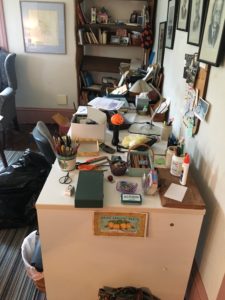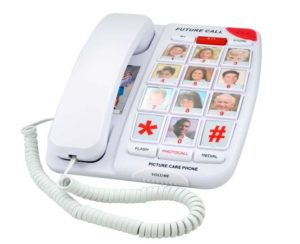She’s not coming back.
I’m here for a month, at the island farmhouse of my childhood, with its fifty years of scrapbooks and hat collections, colored pencils and muffin tins. Room by room, I flit, pruning the weeds of a once brilliant mind. Armed with plastic totes, a fresh box of contractor trash bags, toilet cleaner and my pink Do it Herself toolbox, I’m cleansing the soul of this house.
I find multitudes of notes scrawled in her once-meticulous handwriting: “Church Sunday and Wednesday.” Her name. My cellphone number taped to every doorway. Baskets. Yankee magazines piled high. Broken pens. Thirteen spiral-bound notebooks, filled with sketches and daily observations.
I’m exhausted. just looking at it.



